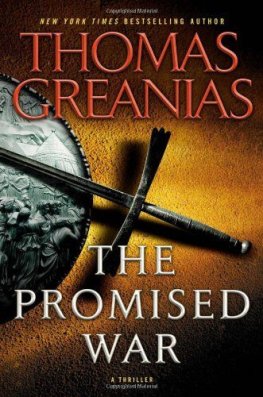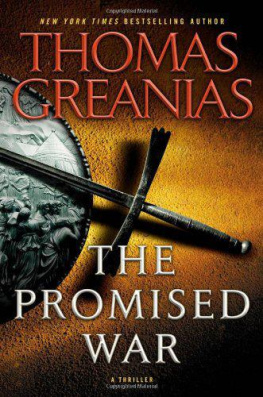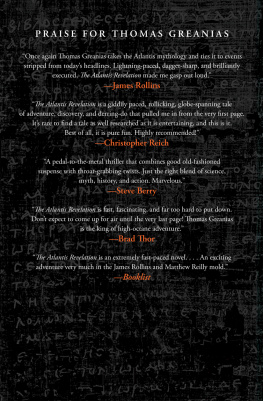Thomas Greanias - The Promised War
Here you can read online Thomas Greanias - The Promised War full text of the book (entire story) in english for free. Download pdf and epub, get meaning, cover and reviews about this ebook. genre: Detective and thriller. Description of the work, (preface) as well as reviews are available. Best literature library LitArk.com created for fans of good reading and offers a wide selection of genres:
Romance novel
Science fiction
Adventure
Detective
Science
History
Home and family
Prose
Art
Politics
Computer
Non-fiction
Religion
Business
Children
Humor
Choose a favorite category and find really read worthwhile books. Enjoy immersion in the world of imagination, feel the emotions of the characters or learn something new for yourself, make an fascinating discovery.
- Book:The Promised War
- Author:
- Genre:
- Rating:5 / 5
- Favourites:Add to favourites
- Your mark:
- 100
- 1
- 2
- 3
- 4
- 5
The Promised War: summary, description and annotation
We offer to read an annotation, description, summary or preface (depends on what the author of the book "The Promised War" wrote himself). If you haven't found the necessary information about the book — write in the comments, we will try to find it.
The Promised War — read online for free the complete book (whole text) full work
Below is the text of the book, divided by pages. System saving the place of the last page read, allows you to conveniently read the book "The Promised War" online for free, without having to search again every time where you left off. Put a bookmark, and you can go to the page where you finished reading at any time.
Font size:
Interval:
Bookmark:
Thomas Greanias
The Promised War
They did not gain possession of the land by their own sword,
but by your mighty hand, because you favored them.
- Zabur 44:3 (Psalm 44:3)1
The Dome of the Rock mosque rose like the moon behind the towering wall that surrounded the Temple Mount. Sam Deker cleared the top of the wall and dropped into the gardens below, a wraith in the night. He glanced at the illuminated hands of his Krav Maga watch. Seven minutes to three. He had told Stern fourteen minutes back at the van. He had used up six. Time was running out.
Deker reached into his combat pack and pulled out a brick of C-4. He had enough bricks to take out half of the thirty-five-acre complex. If he had any doubts about this operation, now was the moment to turn back. He slipped the C-4 back into his pack and moved through the maze of trees and shrubs.
The Temple Mount was the most contested religious site in the world. For Muslims, the eight-sided, golden-capped Dome of the Rock mosque protected the "noble rock" that they believed to be the foundation stone of the earth and the place from which the prophet Muhammad ascended to heaven.
But religious Jews believed the rock was the place from which God gathered the dust to create the first man, Adam, as well as the site of King Solomon's Temple. According to Jewish prophecy, it was also where a new temple would be built-once the Dome of the Rock was gone. Many of these Jews, like Deker's fanatical superior officer, Colonel Uri Elezar, refused to set foot on such holy ground.
None of this was a problem for Deker. He could care less. Deker had been recruited by Israel's internal security service, the Shin Bet, precisely because he was a secular American Jew who had served with the U.S. Marines in Iraq and Afghanistan as a demolitions officer. Who better to protect the Temple Mount, he was told, than a twenty-six-year-old who specialized in the destruction of major structures and equally offended both sides of the religious divide?
Deker followed the route he had planned well in advance, timing his steps with the movements of the Palestinian security guards of the Islamic Waqf, or religious trust.
For almost a thousand years the Waqf had served as the protectors of the Temple Mount, even after Israel captured Jerusalem in the 1967 Arab-Israeli War. Such was their status as the true guardians of Islam-and allegedly above the petty political interests of the modern Palestinian Authority, which claimed it had sovereignty over the site.
Deker, however, knew the Waqf to be as political as any Muslim organization; it simply saw the Arab-Israeli struggle in terms of centuries, not decades. So far as the Waqf was concerned, Israel's resurrection as a modern state in 1948 after three thousand years of exile was but a foul blot on the long scroll of history. Israel, meanwhile, decided it best to prevent unnecessary provocations by its own more zealous citizens. So not only did it allow the Waqf to continue to manage the Temple Mount, it even enforced a controversial ban on Jewish prayers there.
When Deker finally reached the east wall of the Dome of the Rock mosque, he pressed his back against the blue ceramic tiles of the outer wall and peered around the corner. A Waqf guard was making his way across the vast plaza toward the other mosque on the Mount, the silver-capped Al-Aqsa. Deker waited until the guard passed under the ma'avzin arches and disappeared down the steps to the lower plaza. Then without hesitation he darted across the colonnaded entrance of the mosque and ducked inside.
The Waqf officer in charge that night was rounding one of the titanic marble columns that supported the dome twenty meters overhead when Deker entered the mosque. The Palestinian managed to grab his radio, but before he could engage the device to transmit even a sound, Deker gave him a chop to the throat. He crumpled to the floor.
Deker made sure the guard still had a pulse before he turned to his right and followed the plush ruby carpet to the steps that led down to a cave dedicated to King Solomon. A relic of the Crusades, the cave had been carved out by the Order of Knights Templar after they had converted the Dome of the Rock into their Templum Domini, or "Temple of Our Lord."
Medieval maps marked the cave as the "center of the world," and the "well of souls" beneath it was said to have once served as the resting place of the legendary lost Ark of the Covenant. According to the ancient biblical account, the sacred Ark-an ornate box made of shittimwood and coated with gold-contained the original Ten Commandments, the tablets that God gave to Moses at Mount Sinai as the ancient Israelites wandered the desert in search of the Promised Land. Deker thought God-Yahweh to the Israelites-should have simply given Moses a map. It would have saved the Israelites forty years and countless lives.
But the Knights Templar couldn't hold the Temple Mount for long. A few years later it was back in the hands of the Muslim Waqf, where it had remained that past millennium.
Recently, the Waqf had quietly begun a massive subterranean tunneling operation. The Israel Defense Forces, or IDF, feared that the Waqf was on the verge of discovering an ancient network of chambers and corridors deep beneath the mount that predated even the First and Second Jewish Temples. The front door to that network was none other than the well of souls beneath the Dome of the Rock.
Adjan Husseini, the Palestinian head of the Waqf in Jerusalem, was kneeling facedown in prayer when Deker entered the cave. At the sound of Deker's footsteps, he lifted his head and started at the sight of the C-4 brick Deker removed from his pack.
Looking Husseini in the eye, Deker held the brick up and said, "Boom."
"Commander Deker." Husseini rose to his feet. "Go ahead. Take the shot."
Deker put the C-4 brick back into his pack and took out his BlackBerry. Draping one arm around Husseini's neck, he extended the other and snapped a photo with his phone's camera. He then e-mailed it to Colonel Elezar.
"It's time-stamped," Deker said, putting the phone away. "I copied you too."
But Husseini, eyes wide, was staring at the explosives and blinking LED displays inside Deker's open pack, catching on that the C-4 charges were real. "You could have blown us all to bits!"
Deker said, "I promised you that I would expose loopholes in your security in the hopes you'd finally relent and let us put up the electronic surveillance net."
"So you can spy on us."
"So we can better defend the Dome of the Rock from the ultra-Orthodox Jews who want to destroy it so that they can erect a Third Temple. Or from radical Palestinians who would pin the blame on Orthodox Jews. You've seen the intel. The threat's real and it's imminent."
Husseini said nothing for a moment. A hole in the six-foot rock ceiling allowed a shaft of light from the mosque above to illuminate several small altars and prayer niches around the chamber. Deker could see Husseini's eyes study him with bitter resentment through the haze of incense and flickering candlelight.
"You knew from the start that we'd never agree to Israeli surveillance," Husseini said. "Yet, you proceeded to pull this dangerous stunt only to humiliate us."
Husseini was baiting him now, stalling. Deker sensed a trap and realized he had no idea where the Waqf guards outside were at the moment. He thought of Stern back at the van. It was time to leave.
"This security test isn't nearly as dangerous as the weapons cache you've been stockpiling in the southeast corner under Solomon's Stables," Deker said.
Surprise registered on Husseini's face, although Deker wasn't sure if it was real or manufactured by the man.
"Oh, yes, we know about that," Deker told him. "And that tunnel you've been digging right under this cave. If anyone is going to start the fire, it's going to be you."
Font size:
Interval:
Bookmark:
Similar books «The Promised War»
Look at similar books to The Promised War. We have selected literature similar in name and meaning in the hope of providing readers with more options to find new, interesting, not yet read works.
Discussion, reviews of the book The Promised War and just readers' own opinions. Leave your comments, write what you think about the work, its meaning or the main characters. Specify what exactly you liked and what you didn't like, and why you think so.













